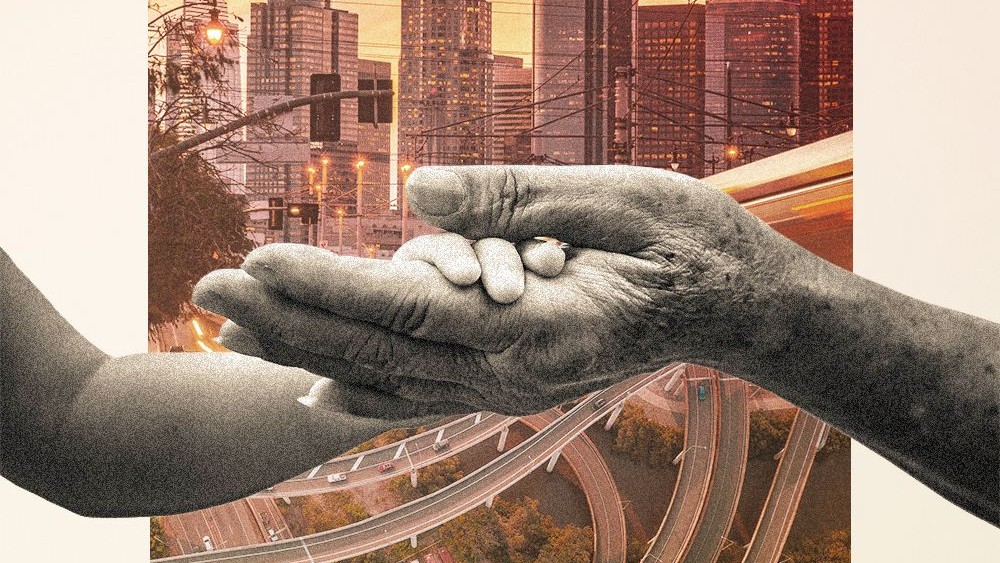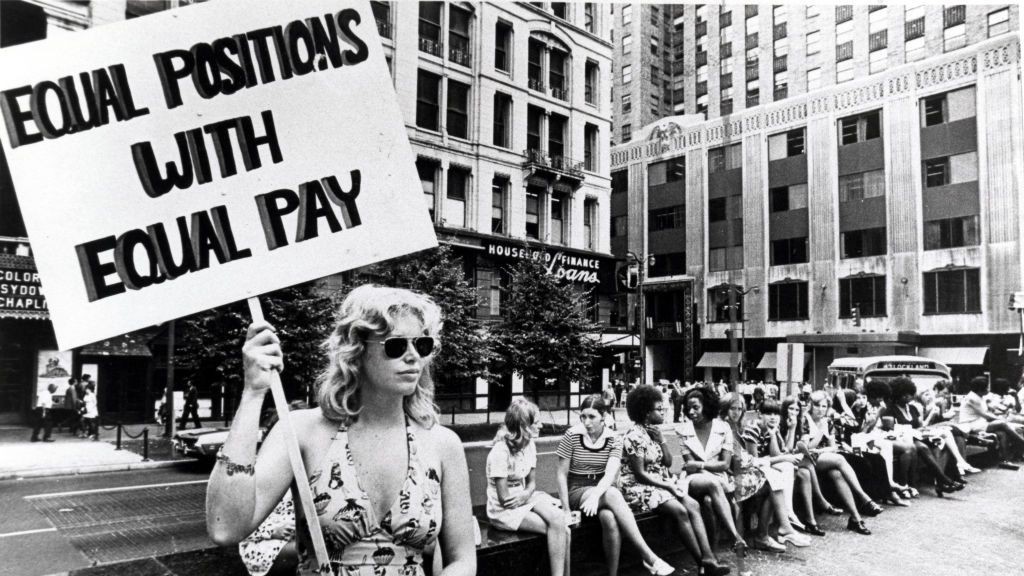Yes, Caregiving Is Essential Infrastructure
President Biden’s American Families Plan is further proof that care is necessary for economic growth.


Some people argue that only roads and bridges are real infrastructure.
They couldn’t be more wrong.
Of course, it’s easy to see the consequences of our underfunded infrastructure in the crumbling bridges and pothole-filled roads around us. We understand that when our physical infrastructure breaks down, so do our opportunities to go to work, to build things, and to grow our economy.
But caregiving is just as critical to our economy as physical infrastructure and is just as underfunded. However, like many issues that disproportionately impact women—especially women of color—it is continually deprioritized.
This fact was exposed over the past year as the cracks in our care infrastructure became impossible to ignore. After spending my career advocating for working mothers, I watched a generation of progress for women go down the drain when a lack of affordable care and paid leave forced more than 2.3 million women to leave the workforce completely to tend to sick loved ones and children who could no longer be in school. More than half of those women were Black and Latina. As a result, women’s participation in the labor force is the lowest it’s been since 1988, when I started my career.
While unpaid caregivers have sacrificed their careers, paid caregivers have served on the front lines of the pandemic without protection, support, or adequate pay. They have also experienced alarming rates of economic hardship. When parents kept their children home throughout the pandemic, one in six child caregivers lost their jobs, contributing to stubbornly high unemployment rates for Black and Latina women. Though we all rely on care at some point in our lives, care providers—most of whom are women and about one-third of whom are Black women—have long been some of our most underpaid workers and were already struggling to make ends meet before the pandemic.
Our broken care infrastructure has disproportionately harmed women, but fixing it will benefit everyone.
Our broken care infrastructure has disproportionately harmed women, but fixing it will benefit everyone. Yesterday, President Biden unveiled his American Families Plan, which is the third part of the Build Back Better Agenda (this includes the American Rescue Plan and American Jobs Plan). It calls for $1.8 trillion of investments in care and education over 10 years—focusing on child care and paid family leave, along with funding for universal pre-kindergarten and two years of free community college for all Americans, including DREAMers. These investments, coupled with the $400 billion proposal towards home- and community-based care for elders and those with disabilities in the American Jobs Plan, would revolutionize how we care for each other in this country.
Stay In The Know
Get exclusive access to fashion and beauty trends, hot-off-the-press celebrity news, and more.
Research from TIME’S UP Now shows that investing in the care sector will create millions of new jobs and generate hundreds of billions of dollars in economic activity. The clock is ticking for policymakers to act, as the care crisis will only get more acute as our population ages. The number of adults over 65 is set to nearly double from 2016 to 2060 while the ratio of caregivers to those who need care is expected to sharply decline.
The pandemic was a wake-up call. It’s clear that without a functional caregiving system, we can’t operate as a 21st century society, one where women don’t have to choose between having a career and providing care for their children and loved ones, where elders and people with disabilities can live in comfort and dignity, and where caregivers have the respect and support they deserve. Now, with a champion for women in the White House and a Democratic majority in Congress, we have the power to create a durable, equitable care infrastructure that will work for everyone.
That means investing in affordable, high-quality care for children, elders, and those with disabilities that will allow millions of women to rejoin the workforce. It means creating millions of good-paying jobs in the care sector and investing in those jobs to ensure paid caregivers are paid family-sustaining wages. And it means creating an inclusive paid medical and family leave program that allows people the flexibility to care for themselves and loved ones in need without losing their livelihoods.
Though conversations over the past few weeks may have suggested otherwise, labeling care as infrastructure isn’t a political trick. It’s a recognition of what our society needs in order to operate at full economic health, especially for women and women of color. President Biden’s American Jobs Plan and American Families Plan are proof of that.
We don’t have to choose between investing in our people and investing in our roads and bridges—both are part of the infrastructure that keeps our society going, and both are essential to an equitable and sustainable economic recovery. It’s time for Congress to act.
Related Story

Valerie Jarrett was the longest-serving senior adviser to President Barack Obama, overseeing the White House Office of Public Engagement and Office of Intergovernmental Affairs, and chairing the White House Council on Women and Girls.
-
 Let's Go, PPG, Fans! A New Peacock Series Starring the 'Love Island USA' Season 6 Cast Is Coming Soon
Let's Go, PPG, Fans! A New Peacock Series Starring the 'Love Island USA' Season 6 Cast Is Coming SoonWe're already clearing our summer schedules for 'Love Island: Beyond the Villa.'
By Quinci LeGardye
-
 Why Princess Diana Didn't Move to America
Why Princess Diana Didn't Move to AmericaThe late royal's friend opened up about the princess's American dream.
By Kristin Contino
-
 Anne Hathaway Doubles Down on Luxury's Favorite Neutral
Anne Hathaway Doubles Down on Luxury's Favorite NeutralShe painted herself in the timeless hue.
By Kelsey Stiegman
-
 36 Ways Women Still Aren't Equal to Men
36 Ways Women Still Aren't Equal to MenFeatures It's just one of the many ways women still aren't equal to men.
By Brooke Knappenberger
-
 How New York's First Female Governor Plans to Fight for Women If Reelected
How New York's First Female Governor Plans to Fight for Women If ReelectedKathy Hochul twice came to power because men resigned amid sexual harassment scandals. Here, how she's leading differently.
By Emily Tisch Sussman
-
 Why the 2022 Midterm Elections Are So Critical
Why the 2022 Midterm Elections Are So CriticalAs we blaze through a highly charged midterm election season, Swing Left Executive Director Yasmin Radjy highlights rising stars who are fighting for women’s rights.
By Tanya Benedicto Klich
-
 Tammy Duckworth: 'I’m Mad as Hell' About the Lack of Federal Action on Gun Safety
Tammy Duckworth: 'I’m Mad as Hell' About the Lack of Federal Action on Gun SafetyThe Illinois Senator won't let the memory of the Highland Park shooting just fade away.
By Sen. Tammy Duckworth
-
 Roe Is Gone. We Have to Keep Fighting.
Roe Is Gone. We Have to Keep Fighting.How To Democracy always offers a path forward even when we feel thrust into the past.
By Beth Silvers and Sarah Stewart Holland, hosts of Pantsuit Politics Podcast
-
 The Supreme Court's Mississippi Abortion Rights Case: What to Know
The Supreme Court's Mississippi Abortion Rights Case: What to KnowThe case could threaten Roe v. Wade.
By Megan DiTrolio
-
 Sex Trafficking Victims Are Being Punished. A New Law Could Change That.
Sex Trafficking Victims Are Being Punished. A New Law Could Change That.Victims of sexual abuse are quietly criminalized. Sara's Law protects kids that fight back.
By Dr. Devin J. Buckley and Erin Regan
-
 My Family and I Live in Navajo Nation. We Don't Have Access to Clean Running Water
My Family and I Live in Navajo Nation. We Don't Have Access to Clean Running Water"They say that the United States is one of the wealthiest countries in the world. Why are citizens still living with no access to clean water?"
By Amanda L. As Told To Rachel Epstein